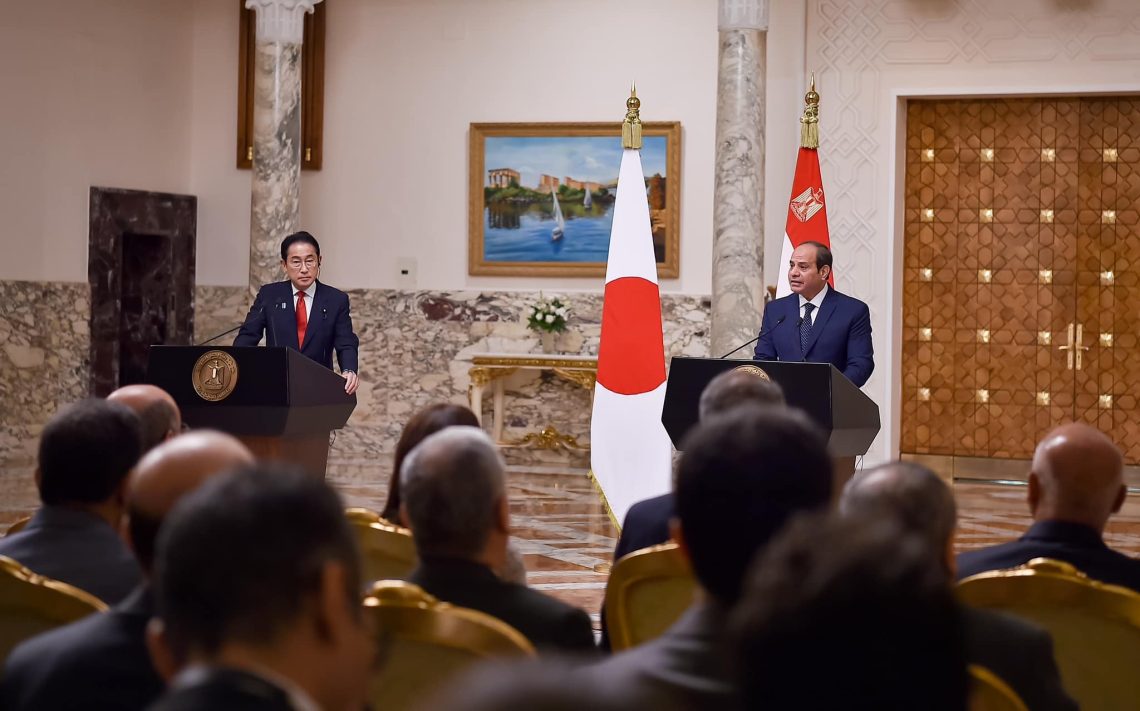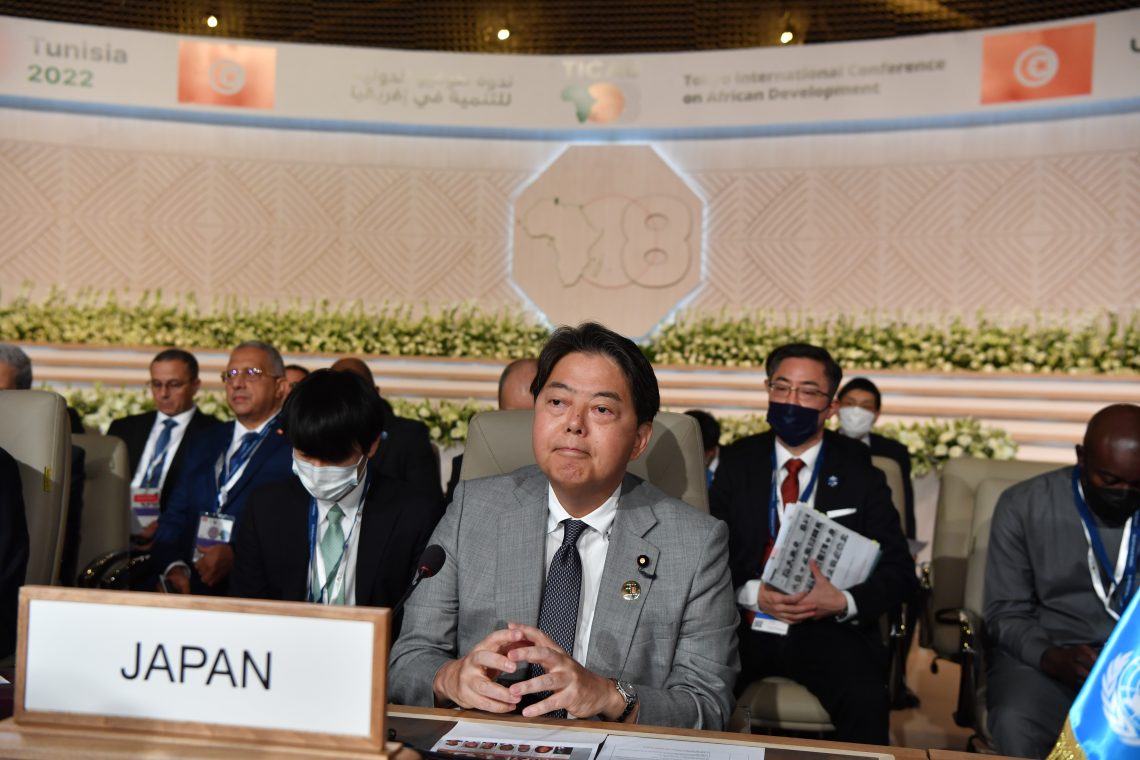Japan’s valuable footprint in Africa
After reassessing its strategic interests, an internationalist-minded Japan has made African relations a higher priority.

In a nutshell
- Japan pledged a record $30 billion in development aid to Africa in 2022
- The aggressive moves of China and Russia are spurring Japan’s interest
- Recipients appreciate Japan’s high-quality and efficient aid programs
Many major world events provide us with a sense of deja vu. The trench warfare in Ukraine reminds us of World War I and China’s global ambitions are similar to the search for “a place in the sun” of Germany’s last emperor William II. In the Far East and particularly in Japan, one notes ominous signs of developments similar to those that led up to the Pacific War from 1941 to 1945.
The history written by the victorious powers is that irresponsible and fanatic imperialists under the leadership of Emperor Hirohito led the country into a disastrous war. It is true that after the victories in the first Sino-Japanese War of 1895 and after the successful war against Russia in 1904-1905, Japanese imperialist forces had received a fillip. It is also true that rightful concerns existed about the future and security of Japan.
Japan’s leadership feared that its ambitious plans for what they called a “co-prosperity zone” would be thwarted by a shortage of essential raw materials and natural resources. Japan then as today is a country with little or no natural resources. Given that its prosperity depends on a functioning world economy with free trade among nations, Tokyo is concerned about the safety of its supply chains.
More by Urs Schöttli
Australia’s foreign policy pivot
Fear of China brings Japan and South Korea closer together
Realism overtakes wishful thinking in Japan
Africa, remote and alien
In 2010, Japan faced a sudden suspension by China of the supply of rare earth materials, presenting a new challenge to trade relations. This time, it was not protectionism or restrictions on imports that caused the problem, but the curtailing of exports. Later on, during the Covid-19 pandemic, Japan suffered supply chain disruptions. The war in Ukraine has further increased Japan’s vulnerability. Business leaders, who had excelled through just-in-time delivery and global sourcing, fell victim.
Like Germany, Japan has to face an important strategic contradiction. Learning a valuable lesson from the disaster of World War II, both countries decided to forsake military power and focus on trade and business. As a consequence, they had low military expenses, relying for their security on the powerful ally of the United States. Little thought was given to a substantial tectonic shift in the international security architecture. The surprise was complete when Tokyo and Berlin had to take note of the national priorities stressed by Donald Trump’s administration. All of a sudden, the security umbrella no longer looked as safe and reliable as it had during the Cold War.

Part of the post-World War II deal was that Japan, while being globally active in the economy, restrained its security policy. Its presence in international crisis management was minimal and void of military engagement. This was to change with the second Iraq War and, later on, with the ascent of the internationalist, the late Shinzo Abe, as Japan’s longest-serving prime minister. Since 2021, Prime Minister Fumio Kishida has continued with the globally high-profile policies of Mr. Abe, as the recent G7 meeting hosted in Hiroshima showed.
It makes sense that the first moves in this turn toward internationalism were to focus on Asia. Of course, Japan Inc. had long ago spread its presence across Asia, with Singapore and Thailand being forerunners for Japan’s economic engagement and with Indonesia, India, Vietnam and Australia following suit. After the tides of time, this expansion of the Japanese presence is no longer restricted to economic issues but is very much part of security concerns.
It was the European powers and the U.S. that opened Asia to the world in the 19th and 20th centuries. The Europeans used the classical instruments of colonialism, while the U.S. largely used its naval power for pressure. It was, therefore, understandable that for the past several decades the international focus in Asia was on the industrialized West. Latin America and Africa were and are still marginal – due to geographical factors, but also due to history and culture.
In Japanese media and in the boardrooms of the country’s big corporations, Africa hardly figures. Unlike European colonial powers, Japan never had an overseas presence in Africa and Latin America, while it did take over – albeit for a very short time – most of the European colonial possessions in Southeast Asia.
Unlike the Chinese, the Japanese did not migrate overseas in large numbers, with the notable exception of Brazil. A highly restrictive immigration policy makes for very small foreign communities in Japan. Almost all foreigners come from China, South Korea, Vietnam or the Philippines. The African presence is minuscule and, correspondingly, there is hardly any interest in the continent.
Given its reliance on global trade, Japan measures its foreign relations in trade and investment volumes. And even here, the entire, huge continent of Africa is marginal.
Last year the total trade volume of Japanese exports reached $747 billion. At the same time, the entire bilateral trade volume between Japan and Africa was a mere $24 billion. Japan’s most important trading partner on the continent is South Africa and the structure could be the future for many bilateral relationships: Japan imports raw materials and it exports cars.

An important competition in values
This dynamic is changing. Tokyo is showing growing concern about the Russian and particularly the Chinese presence in Africa. It sees its expansive policies as a serious threat to its own economic interests. Japan is increasing its aid volume substantially through Official Development Assistance (ODA).
Since 1993 Japan has led the Tokyo International Conference on African Development (TICAD), a forum cohosted by the United Nations, the United Nations Development Program, the World Bank and the African Union Commission. Last year, at the 8th TICAD in Tunisia, Japan pledged $30 billion, coming after China had promised $40 billion the year before. TICAD is focused on the economy, society, peace and stability – the core issues of Japan’s overseas engagement.
The Japanese government has declared two guiding principles for its development aid in Africa: “quality growth (inclusiveness, sustainability and resilience) and human security (capacity building focusing on each individual in Africa).” Traditionally, and not only in Africa, ODA delivered by Japan is highly appreciated in recipient countries. This is due both to the high quality of Japanese technical assistance and to the efficiency of project implementation.
China pursues the “Beijing Consensus” that promotes its system of overwhelming state power and one-party rule as a model for developing economies. Japanese engagement in Africa, on the other hand, is based on values that are familiar to Western countries and societies.

China’s push for economic and geopolitical influence in Africa and its unmistakable ambition for global superpower status is causing alarm not only in the U.S. and in Europe but also in Japan. There are powerful voices in Japan’s political and economic establishment who advocate a more China-like strategy when deciding who and what fields should profit from Japanese aid and trade. Many promote the Chinese way, which, they claim, resonates more with the political status quo in many African countries. This model would not lend too much attention and concern for human rights violations, corruption and abuse of political power. The argument is that Japan’s approach inevitably loses out to China.
However, there are significant counterarguments, which are not altruistic but also appeal to the interests of Japan and the recipients. There is a global trend toward sustainability when it comes to investment and financial projects. This is not only ecologically motivated but also based on keeping social stability.
It may be true that in the short term, the Chinese approach might give greater returns by strengthening its influence in Africa. However, one must consider several reports that have indicated difficulties with, and even total failures of, the Chinese projects. Equally telling are the financial challenges that result from the structure of Chinese development aid, which leaves developing countries with giant debts that are hard to service.
Scenarios
Three scenarios should be considered.
The most unlikely is that the Japanese government might reduce ODA due to fiscal tightening and high financial demands at home, caused by a shrinking and aging population. There are indeed voices that want to focus more on issues and challenges closer to home. This may also result from a general skepticism about the value of development aid, particularly when aimed at countries where the abuse of resources by irresponsible and corrupt elites is rampant.
The second scenario entails a decisive shift toward the Chinese approach in that the principles of Japanese ODA for Africa are guided primarily by geopolitical concerns. With the international situation remaining unstable and China continuing its determined drive to the top, more pragmatism will likely be adopted by the Japanese. The bureaucracy in Tokyo will focus on minimal political risks and projects, while more ambitious and innovative ones will face greater scrutiny.
While power politics will remain within the scope of a third scenario, there is nevertheless the chance and the challenge that the footprints of Japan’s development policy will become more effective. Japan has international ambitions, the most emblematic one being a permanent seat in the United Nations Security Council, which might be more achievable if it displays its soft power in terms of societal values that guide its aid program.









